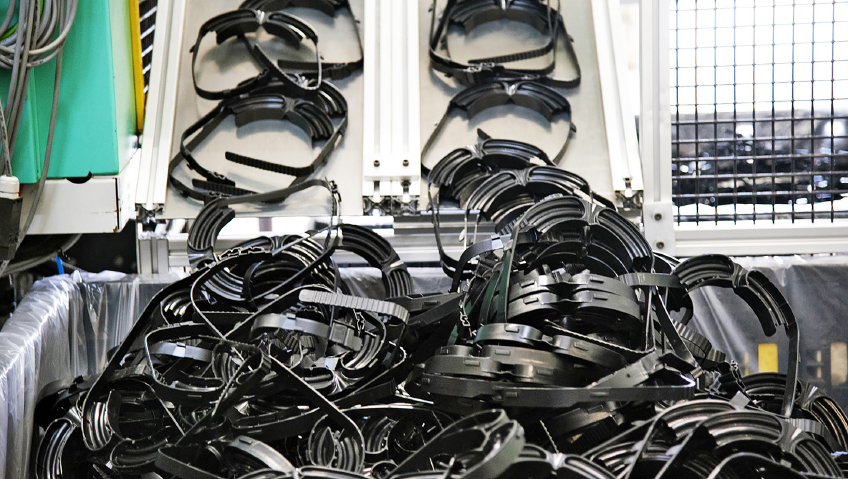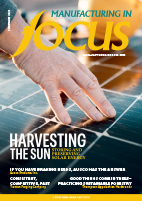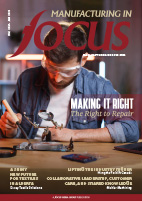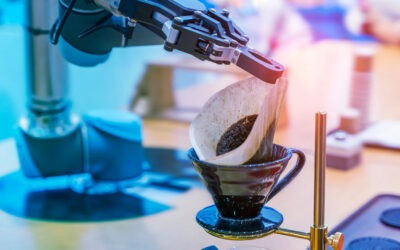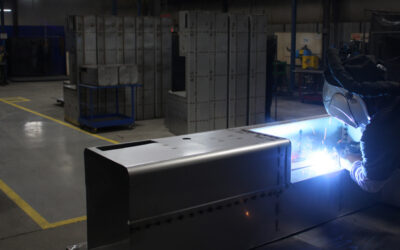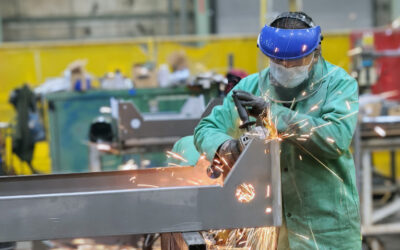When historians look back on COVID-19, they’ll see nothing but change – in lives, relationships, politics, power, and education. And in industry, where a Canadian company spots the obvious and then fixes it – bringing a whole 15,000 km supply chain in-house.
The coronavirus was characterized by the WHO as a pandemic on March 11, 2020. Less than two weeks later, cases started appearing in North America. With lockdowns and stay-at-home orders issued, our lives turned upside down.
To cap it all, COVID showed us how vulnerable we are – how dependant we were on other countries for such simple, but crucial, things as personal protective equipment (PPE), such as medical masks, disposable gloves, face shields, and hand sanitizer.
Problem meets opportunity
When supply chains of medical products, many of them from China, slowed or broke entirely, various levels of government across Canada put out the call to manufacturers for help, and many listened. In Ontario’s Oro-Medonte Township, Molded Precision Components (MPC) – known mainly for its work in the automotive sector – acted quickly and decisively.
“It’s been an amazing challenge,” says MPC President and Owner David Yeaman. Looking to diversify into medical products – which require superior standards and perfect quality – prior to the pandemic, the company already had some of the tools and manufacturing capabilities in place when the need for medical PPE became dire.
With many capabilities, including advanced engineering, automation, design and development, contract manufacturing, automation and tool design and build, Molded Precision Components works with many large Tier 1 multinational customers.
Pulling out all the stops
When the pandemic worsened in March of last year, the company’s work in automotive plummeted. Scrutinizing the PPE list requirements from Prime Minister Justin Trudeau and Ontario Premier Doug Ford, Yeaman jumped at the chance to help.
Starting on a Monday, the company had a patent-pending design for a new face shield developed by Friday.
By the following Tuesday, MPC received a grant from Next Generation Manufacturing Canada (NGen) to execute the order: to manufacturer a new Canadian patent-pending, two-piece, medically approved, recyclable face shield. To carry-out the demanding order, MPC added 115 students to its existing roster of 55 workers.
Working tirelessly throughout the summer, MPC made 27 million face masks for front-line workers.
It was the ultimate Canadian success story: people coming together during a crisis. Over six months, MPC built-out every machine in its facility, and purchased 16 brand-new moulding machines.
Temporarily moving its warehouse into a local hockey arena, the company transformed the space into a mass manufacturing PPE factory – over-doubling its capacity with all the new equipment – along with installing some machines into other local moulding facilities as well. The company also took over an abandoned fire hall for its automation group.
“So we had the fire hall, a hockey arena, and directly across the road was a drive-in which we took over for parking, because we didn’t have parking for 185 people. On any one day, we’d have 80 to 100 vehicles parked in the drive-in,” says Yeaman of the move, which saw the company relocating from last March to September.
Running 24/7 continental shifts to make millions of masks quickly pushed Molded Precision Components in unexpected directions.
A new facility, none too soon
Originally founded as Molded Plastic Consultants in 1980, the business was first owned by a German toolmaker making small prototype tools. Realizing its great potential, the company was purchased by David Yeaman and Thomas Woegerer in 2006. Mechanical engineers with a background in automotive plastics injection moulding, the duo “kind of took it from scratch and build it into a lights-out Industry 4.0 manufacturing facility,” according to Yeaman.
Although the business was small at the time and operating with a handful of employees, it was a known commodity. And since Yeaman and Woegerer were manufacturers and not consultants, they changed the name from “Consultants” to “Components,” cleverly retaining “MPC” unchanged.
In 2016, the name change took effect, along with a new logo featuring a micrometer and a stylized cog wheel to represent precision.
This past September saw MPC celebrate the opening of its new, state-of-the-art manufacturing facility. Including office space, the new structure “will help expand our advanced manufacturing capabilities and secure critical supply chains here in Canada,” says Yeaman.
Prior to starting construction in January 2020, the company was at 28,000 square feet between two facilities. The addition of 45,000 square feet will see the company at approximately 73,000 square feet total. “It’s a huge expansion,” says Yeaman. “We’ve multiplied it by three.”
The massive new facility will house a world first: a vertically integrated filling and automated packaging system for hand sanitizer, “capable of producing 80,000 litres a day – from pellet-to- pallet in-house,” according to the company.
Home to over 70 members of the MPC team, it will boast 15 new injection moulding machines with full automation capabilities, a new cube injection moulding (CIMS) machine, and 4,000 square feet of cleanroom manufacturing space, making it ideal for medical production.
In the months prior to COVID, most of MPC’s business was automotive, with the company receiving its first medical contract in November 2019. The initial plan for the new building was a mix of automotive technology and some medical, which triggered the company into needing a new building, “but my plan was that we would fill that new building up over 5 to 10 years,” says Yeaman. “That kind of happened in six months.”
Supply chain challenges
At the height of the pandemic, Canada faced a desperate shortage of PPE including face shields, medical masks, swabs, pipettes for testing, and hand sanitizer.
Starting down the path of making N95 masks, MPC was soon asked about making caps and bottles for sanitizer, with NGen putting out the challenge to help develop new advanced manufacturing systems to fight COVID and other future pandemics.
“When we saw the demand for caps and bottles for sanitizer, being a plastics company, we looked at that and said ‘what can we do to do something different from what’s out there currently with the global supply chain model?’” says Yeaman.
Typically, the process to make and fill plastic bottles with sanitizer is costly, and consumes an abundance of resources such as heat and fuel. Plastic preforms, which look like test tubes, are made in China. These are shipped by sea to ports in North America where they are placed on trains, then transported by truck to a blow moulder facility.
Once heated, they are blown into bottles, which are packaged and shipped to a company who fills the bottles with sanitizer, likely brought in from an outside company. The filled bottles are moved to skids, and shipped.
“When you analyse and trace that supply chain, that plastic travels 15,000 km,” says Yeaman. “It goes through four to five different companies. It goes through 5,000 square feet of warehouses and manufacturing facilities. It takes about three months to get here in normal times, and during the pandemic it didn’t come at all.”
Changing the game
Realizing that the current supply chain system has many downfalls – from Canada’s dependency on other countries to lengthy time frames, and energy waste to pollution – MPC looked at how to make a bottle in a one-step process, then vertically integrate that with fill lines and the sanitizer matching process.
Through its Cube system used for automotive manufacturing, the company examined how it could transform multiple steps into a one-step process.
The challenge: create a vertically-integrated combination injection-moulding device that injection-moulds preforms, blows them into bottles, sees the bottles directly into the fill line, fills the bottles with sanitizer made on-site, and caps, labels and packages them with no hands touching the product until completion.
Dubbed the pellet to pallet system, this saw MPC put together a proposal from Ngen.
“This is actually the first-in-the-world system for manufacturing hand sanitizer that takes a pallet of plastic to a finished product in 18 minutes,” says Yeaman. “So if you compare the global supply chain model of 15,000 km that pallet travels before it hits a skid ready to be bought, ours goes 100 feet. Instead of four to five companies, it goes through one. And instead of 500,000 square feet of companies and everything, it’s in 15,000 square feet and it saves 5,000 tons of CO2 a year for the environmental impact, to put it in perspective.”
And since all materials and ingredients, from packaging to sanitizer, come from Canadian sources, this technology reduces our dependence on other countries.
“At the end of the day, when things settle, you’re going to have to compete globally,” says Yeaman.
“So you are going to have to innovate either product and/or process to be globally competitive. You can’t just say, ‘well, we are here in Canada so pay me more.’ What are we doing differently that changes the game with your product and/or process that allows you to be globally competitive, that gives you a sustainable model going forward under normal times? Then you’ll have sales,” he says.
Globally competitive
“It’s not just tooling-up what everybody else is doing, it’s coming up with something different, and that’s what we’ve done with the sanitizer. We’ve taken a global supply chain and put it in the 15,000 square feet And we can now make up premium product that’s safe at a globally competitive margin.
“So now we’ll have a sustainable business doing that, and at the same time we’re securing our supply chain. So we are not asking our customers to pay more because we’re Canadian – yes, it’s a benefit to you – but at the same time we can compete with anybody around the world because we elevated the process.”
Working toward the future, Yeaman and his team at MPC continue recruiting the best and brightest from Ontario’s universities and colleges including Waterloo, Queens, the University of Toronto, and Georgian College.
“Supporting and building youth and helping them reach their full potential is a big core of what we are about in terms of our community involvement, and what we are trying to do here,” he says. “So there’s a lot of effort put into youth.” This includes apprenticeships and a scholarship program where every summer one or two students are awarded a scholarship to help with their school expenses.
Recent months have seen other initiatives, including a relationship with Sustainable Development Technology Canada (SDTC) to support the development of green technology in Canada. Continuing to work on implementing its sanitizer system, the company keeps growing in medical, automotive, food and beverage, and industrial sectors.
One of the company’s biggest initiatives remains the development of a vertically integrated, 83-acre medical innovation park called MediCA. This will see companies collaborate in order to secure supply chain in Canada on critical health security needs.
“The sanitizer line is the perfect example demonstration model of what can be done if we take a good look at the global supply chain model on these products and say ‘how can we bring those together so we can secure the supply chain and at the same time reduce costs, and have a positive impact on the environment?’” says Yeaman.
“That’s what the sanitizer model proves. We want to expand on that across the board of all medical supplies that are critical to our health.”

